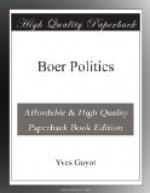On the 26th May, Dr. Jorissen, a Boer delegate, reverting to the question, said:—
“Concerning the paragraph referring to a young person, I desire to remove what may create an erroneous impression. What Mr. Krueger meant to say is this; according to our law, a newcomer is not immediately considered a burgher. The words ‘young person’ have not reference to age but to length of residence. According to our ancient ‘Grondwet’ (constitution) you must have resided one year in the country to become a burgher.”
These minutes were not compiled for the present occasion, for they were published in 1882.
4.—Preamble of the Convention of 1881.
The preamble of the convention is in the following terms:—
“Her Majesty’s Commissioners for the settlement of the Transvaal territory, duly appointed as such by a Commission, &c., the 5th day of April, 1881, do hereby undertake and guarantee on behalf of Her Majesty, that from and after the 8th day of August, 1881, complete self-government, subject to the suzerainty of Her Majesty, her heirs and successors, will be accorded to the inhabitants of the Transvaal territory.”
It is evident that this is not a treaty between two parties contracting on a footing of equality. The English Government grants the Transvaal the right of self-government, reserving the suzerainty under certain conditions. I have already shown the difficulties in the way of carrying out the Convention of 1881, the false position of the Resident who was as one conquered, was supposed to control the actions of the conqueror; and I have also spoken of the great and long suffering of the English Government.
Mr. R.D. Faure, who acted as interpreter to the Conference of 1884, has stated that “the Transvaal delegates asked for a clause suppressing the suzerainty, and that Lord Derby refused it.” To this Mr. R.G.W. Herbert, Permanent Under Secretary for the Colonies, replied “that the Commissioners did not venture to ask for the abolition of the suzerainty.” They confined themselves to asking in their letter to Lord Derby of November 14th, 1883, that “the relation of dependence, publici juris, in which our Country finds itself placed with regard to the Crown of Great Britain should be replaced by that of two contracting parties.”
Lord Derby on 29th November, answered that “neither in form, nor in substance could the Government accept such a demand.” The Government thus refused to substitute a “treaty” for a “convention” in which the Queen granted to the Transvaal the right of self-government under certain conditions.
5.—Articles 4, 7 and 14 of the Convention of 1884.
These conditions are determined by the articles 4, 7 and 14 of the convention of 1884, of which the following is the text:—




